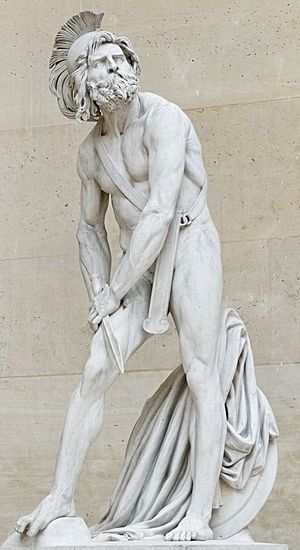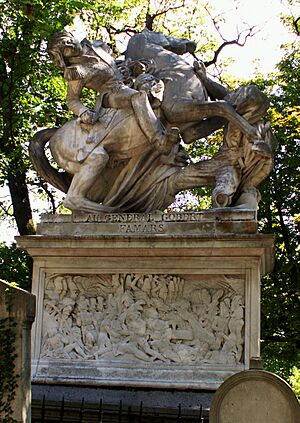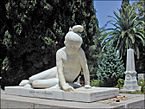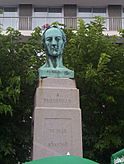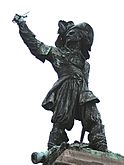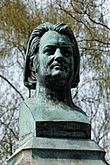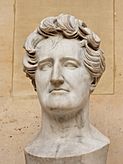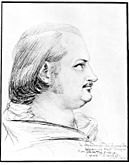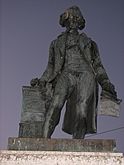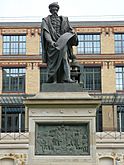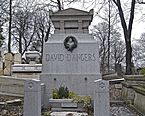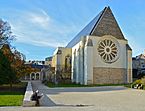David d'Angers facts for kids
Quick facts for kids
David d'Angers
|
|
|---|---|
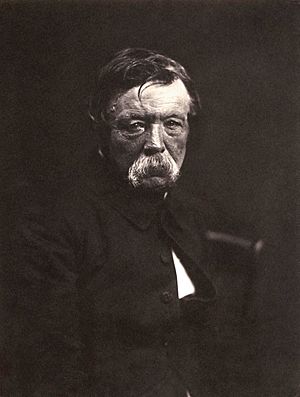
David d'Angers (1853);
photograph by Édouard Baldus |
|
| Born |
Pierre-Jean David
12 March 1788 Angers, France
|
| Died | 4 January 1856 (aged 67) |
| Nationality | French |
| Occupation | sculptor and medallist |
Pierre-Jean David (born March 12, 1788 – died January 4, 1856) was a famous French sculptor and medalist. He was also an active freemason. He chose the name David d'Angers to show that he was from Angers. This also helped people tell him apart from a famous painter named Jacques-Louis David, whose studio he joined in 1809.
Contents
Life of a Sculptor
Pierre-Jean David was born in Angers, France, in 1788. His father was a wood carver and sculptor. When David was young, his father joined the army to fight in a war in Vendée.
Early Studies and Success
David began his art studies with Jean-Jacques Delusse. In 1808, he moved to Paris to study with Philippe-Laurent Roland. While in Paris, he worked on famous buildings like the Arc de Triomphe and the Louvre.
In 1810, he won second place in a competition at the École nationale supérieure des Beaux-Arts, a famous art school. The next year, his sculpture La Douleur won another prize. In the same year, he won the important Prix de Rome for his work Epaminondas. This prize allowed him to study in Rome for five years.
Time in Rome and Return to Paris
While in Rome, David spent time in the studio of the famous sculptor Antonio Canova. He also traveled around Italy, visiting cities like Venice, Naples, and Florence.
After returning from Rome, David faced some difficulties in London. People there mistakenly thought he was related to the painter David, and they were not friendly because of political reasons. He then made his way back to Paris.
A Successful Career
Once in Paris, David d'Angers became very successful. Many people wanted him to create medallions and busts (sculptures of heads and shoulders). He also received orders for large monuments.
One of his most famous works is the statue of Johannes Gutenberg in Strassburg. He also created monuments to heroes like Barra, a brave drummer boy, and Markos Botsaris, a Greek liberator.
David made many busts and medallions. He sculpted important people from France, England, and Germany. He visited England and Germany in 1827 and 1829 for his work. He created over 500 medallions!
His most famous works include the large sculpture on the front of the Pantheon building in Paris. His marble sculpture Wounded Philopoemen is in the Louvre museum. He also created an equestrian (on horseback) monument to General Jacques-Nicolas Gobert in Père Lachaise Cemetery. David also made sculptures for seven other tombs at Père Lachaise, including bronze busts of the writer Honoré de Balzac and the doctor Samuel Hahnemann.
Kindness and Legacy
David d'Angers was known for his kind heart. Once, he heard that Rouget de Lisle, who wrote the French national anthem The Marseillaise, was very sick and poor. David quickly sculpted him in marble, then held a lottery to sell the work. He sent all the money to the poet to help him.
About his monument Reviving Greece, which shows a Greek child reading the name of the liberator Markos Botsaris, the famous writer Victor Hugo said it was one of the most beautiful statues in the world. He felt it combined the greatness of ancient Greek sculptors like Phidias with the expressive style of Pierre Puget.
Today, the Musée David in Angers has almost all of his works. You can see copies or original molds of his sculptures there.
Museums
- David d'Angers gallery, Musée des Beaux-Arts, Angers
- Musée Carnavalet, Paris
- Musée de la Vie romantique, Paris
Selected works
-
Bust of Armand de Bricqueville, Cherbourg-Octeville
-
Bust of Honoré de Balzac, cimetière du Père-Lachaise
-
Bust of Georges Cuvier, musée du Louvre
-
Portrait of Honoré de Balzac
-
Statue de Xavier Bichat, Paris Descartes University
-
Statue of Gutenberg, Imprimerie nationale, Paris
Images for kids
-
George Washington (1828)
-
Johann Wolfgang von Goethe (1829)
-
Victor Hugo (1837)
-
Konstantinos Kanaris (1852)
See also
 In Spanish: David d'Angers para niños
In Spanish: David d'Angers para niños
 | Victor J. Glover |
 | Yvonne Cagle |
 | Jeanette Epps |
 | Bernard A. Harris Jr. |


